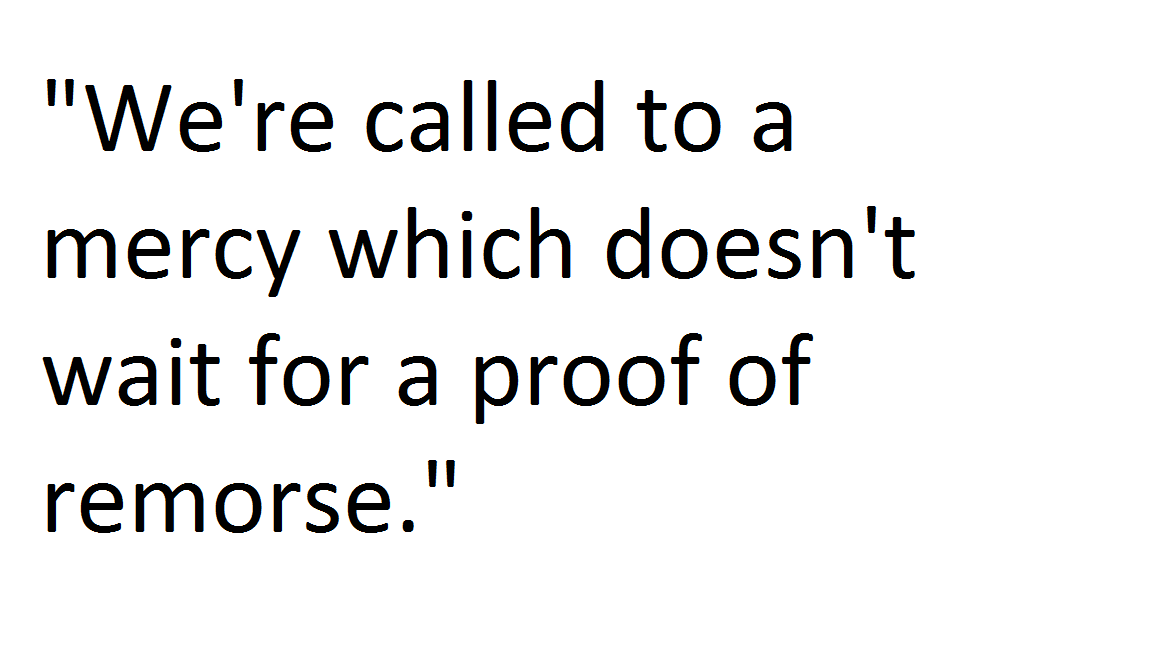Blessed are the merciful, for they shall obtain mercy. (Mt 5:7)
The reward here seems at first to be only an equal return; but indeed it is much more; for human mercy and divine mercy are not to be put on an equality. (St. John Chrysostom)
“Mercy me!” What are people getting at with this exclamation? Like many of the strange utterances of the English language, it speaks to a certain aspect of our human experience, namely, that we need mercy. Not everyone recognizes this truth, but its truth is for everyone. What “Mercy me!” really says is, “Goodness gracious, I need mercy, so have mercy on me, and soon!” We can see the same sense of urgency in the Psalms: Be pleased, O Lord, to rescue me; / Lord, make haste to help me. . . . You are my rescuer, my help; / O my God, do not delay (Ps 40:14, 18).
So we all need to be shown mercy. But it’s a two-way street: we also need to show mercy to others. After all, our Lord taught us to pray, Forgive us our trespasses as we forgive those who trespass against us. But showing mercy to others can be hard, especially when the recipients of our mercy don’t think they need it. Of course, this doesn’t remove our responsibility to show them mercy; it just makes it more difficult.
 Everyone knows that the debates concerning the nature and scope and even value of marriage can be fierce. Many who promote and defend marriage have experienced criticism and even scorn from those who disagree. This is often felt in merely minor ways, but it can also be overwhelming and upsetting, especially when not the message but the speaker is attacked. Yet even here, mercy is necessary. It can seem a strange thing, to forgive someone who not only has not asked for forgiveness but who even thinks he has done nothing wrong. But we’re called to a mercy which doesn’t wait for a proof of remorse.
Everyone knows that the debates concerning the nature and scope and even value of marriage can be fierce. Many who promote and defend marriage have experienced criticism and even scorn from those who disagree. This is often felt in merely minor ways, but it can also be overwhelming and upsetting, especially when not the message but the speaker is attacked. Yet even here, mercy is necessary. It can seem a strange thing, to forgive someone who not only has not asked for forgiveness but who even thinks he has done nothing wrong. But we’re called to a mercy which doesn’t wait for a proof of remorse.
In order to have mercy on others, we must recognize our own need for mercy. Far from haughtily imploring mercy for others, which can quickly turn into the arrogant prayer of the Pharisee, forgetting about mercy and only praising one’s own good qualities (cf. Lk 18:9-14), we are instead called to pray that the mercy shown to us be extended to our neighbors as well. St. Augustine beautifully describes the encounter with mercy when he recounts the forgiveness of the woman caught in adultery: Relicti sunt duo: misera et misericordia; “Two were left: the miserable one and mercy.” We ourselves are these miserable ones, these sinners who are utterly lost without the one who is mercy itself. The mercy we are called to implore for others is the same mercy we are called to implore for ourselves. And there is a transformative quality to this divine mercy: when God forgives, much more than when we forgive, lives and hearts are changed. In the work of promoting and defending marriage, this is what we are called to pray for: that God may have mercy on us, and extend that mercy to those who perhaps have not yet sought it; that hearts, both theirs and ours, may be changed.
~
This series is a guest contribution by a Dominican student brother who has been fulfilling his pastoral ministry assignment by serving as an intern at the USCCB’s Secretariat for Laity, Marriage, Family Life, and Youth.

Leave a Reply